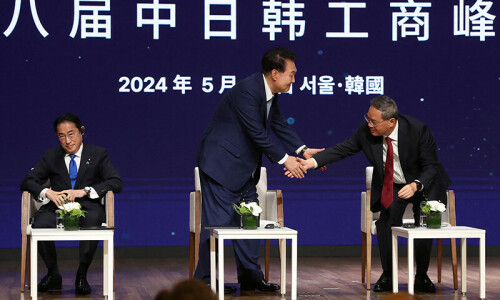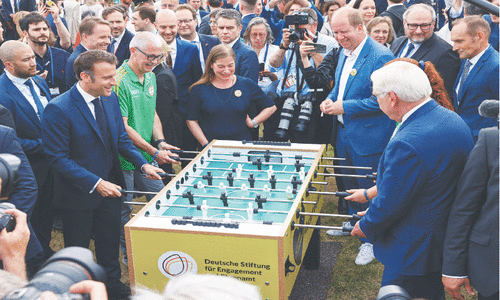WASHINGTON: To improve its influence and image in the world, the US should refrain from building new nuclear weapons, scrap the Bush doctrine of preventive war and regime change, break its climate-changing oil habit, and recommit to international rule-making organizations such as the UN.
The musings of a leftwing think-tank? A liberal pipedream? Not a bit of it. These proposals come from Richard Haass, a leading light in the US foreign policy establishment and former senior official in the Clinton and Bush administrations.
As strategists ponder America’s future direction amid continuing international divisions over Iraq, the ‘war on terror’, Kyoto, trade and a host of other issues, Mr Haass’ new ‘integration doctrine’ is being taken seriously. Henry Kissinger, hardly a radical, is a fan. This master plan for deepened international collaboration, a global version of the 19th century Concert of Europe, is set out in Mr Haass’s latest book, The Opportunity: America’s Moment to Alter History’s Course .
As his title implies, Mr Haass does not believe the US should surrender its post-1945 leading role. But he suggests its national interests will be best served if hubristic ideas about American exceptionalism, indispensability and unilateralism are tempered by more pragmatic, mutually beneficial cooperation with emerging powers such as Europe and China. Pointing to perhaps the biggest lesson of the neo-conservative era, Mr Haass says hyperpower has limits — and they have been reached.
“The US does not need the world’s permission to act, but it does need the world’s support to succeed,” he writes.
Iraq, for example, had become a ‘magnet and a school for terrorists’. The US should push for a new set of international ‘rules of the road’ before the opportunity afforded by post-Cold War American primacy is squandered, he argues.
Controversially, he urges President Bush to cool his evangelical enthusiasm for spreading democracy. Affording primacy to that aim is ‘neither desirable nor practical’, Mr Haass says.
Mr Haass’s attempt to substitute 21st century integration for 20th century containment is only one contribution to an intensifying debate reassessing America’s policies.
In a devastating essay in the New York Review of Books on post-invasion failures in Iraq, Peter Galbraith, a former US ambassador, condemns the American ‘arrogance and ignorance’.
He says the US must accept that while the guerillas cannot win, neither can they be defeated and that the attempt to agree a lasting uni-state constitution is doomed. Only a ‘drastic change of strategy’ involving a loose confederal structure of three self-governing communities can save Iraq from disintegration, he claims.—Dawn/Guardian News Service













































Dear visitor, the comments section is undergoing an overhaul and will return soon.